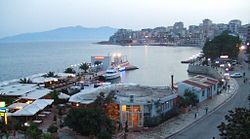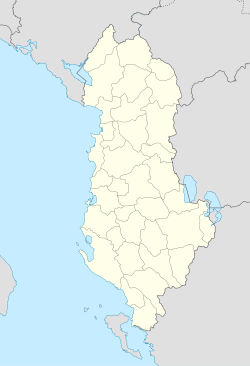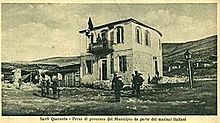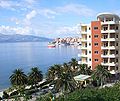- Sarandë
-
Coordinates: 39°52′N 20°00′E / 39.867°N 20°E
Sarandë
Saranda— Municipality and City — Coordinates: 39°52′N 20°00′E / 39.867°N 20°E Country  Albania
AlbaniaCounty Vlorë County District Sarandë District Government – Mayor Stefan Çipa (PS) Elevation 0.8 m (3 ft) Population (2001)[1] – Total 30,000 Time zone Central European Time (UTC+1) – Summer (DST) CEST (UTC+2) Postal code 9701-9703 Area code(s) 085 Website bashkiasarande.gov.al Sarandë or Saranda (Greek: Άγιοι Σαράντα, Agioi Saranda; Turkish: Aya Sarandi; Italian: Santi Quaranta) is the capital of the District of Sarandë, Albania, and is one of the most important tourist attractions of the Albanian Riviera. It is situated on an open sea gulf of the Ionian Sea in the Mediterranean 2 nautical miles from the Greek island of Corfu. The city of Saranda has a population of about 30,000 (2001 estimate).[2] Near Sarandë are the remains of the ancient city of Butrint, a UNESCO World Heritage site.
Alongside its ethnic Albanian majority, Sarandë is home to an ethnic Greek minority and is considered one of the centers of the Greek minority in Albania.
Contents
Name
Sarandë's current name derives from the name of the Byzantine monastery of the Agioi Saranda (Greek: Άγιοι Σαράντα), meaning the "Forty Saints" and honoring the Forty Martyrs of Sebaste. Under Turkish rule, this became Aya Sarandi and then Sarandoz. Owing to Venetian influence in the region, it often appeared under its Italian name Santi Quaranta on western maps.[3] This usage continued even after the establishment of the Principality of Albania, owing to the first Italian occupation of the region. During the second occupation in World War II, Benito Mussolini changed the name to Porto Edda, in honor of his eldest daughter.[4][5] Following the restoration of Albanian independence, the city employed its Albanian name Saranda.[6]
History
In antiquity the city was known by the ancient Greek name of Onchesmos or Anchiasmos [7][8][9] and was inhabited by the Greek tribe of the Chaonians.[10] Onchesmos flourished as the port of the Chaonian capital Phoenice[11][12] (modern-day Finiq). In AD 552, it experienced repeated attacks from the Goths.[citation needed]
In 1878, a Greek rebellion broke out, with revolutionaries taking control of Sarandë and Delvinë. This was suppressed by the Ottoman troops, who burned twenty villages in the region.[13] The town was included in the newly formed Albanian state in 1913 under the terms of the Protocol of Florence.[14]
It was occupied twice by Greece in 1913 and from 1914 to 1916, the second time by Greek insurgents from the Autonomous Republic of Northern Epirus. It was then occupied by Italy between 1916 and 1920 as part of the Italian Protectorate on southern Albania.[15] Sarandë was again occupied by Italian forces in 1939 and was a strategic port during the Italian invasion of Greece. During this occupation, it was called "Porto Edda" in honor of the eldest daughter of Benito Mussolini.
As part of Northern Epirus, the city came under Greek rule on 6 December 1940 until the German invasion in Greece in the spring of 1941.
Economy
Given its coastal access and Mediterranean climate, Sarandë has become an important tourist attraction since the fall of Communism in Albania. Saranda as well as the rest of the Albanian Riviera, according to The Guardian, "is set to become the new 'undiscovered gem' of the overcrowded Med."[16] Tourism is thus the major economic resource, while other resources include services, fisheries and construction. The unemployment rate according to the population census of 2008 was 8.32%. It has been suggested that family tourism and seasonal work during the summer period help mitigate the real unemployment rate. Recently, the town has experinced an uncontrolled construction boom which may hamper the city's future tourism potential.
Climate
Sarandë has a typical Mediterranean climate.
Climate data for Sarande (1991-2010) Month Jan Feb Mar Apr May Jun Jul Aug Sep Oct Nov Dec Year Record high °C (°F) 24
(75)25
(77)27
(81)29
(84)36
(97)39
(102)42
(108)42
(108)38
(100)30
(86)27
(81)25
(77)42
(108)Average high °C (°F) 13.6
(56.5)14.1
(57.4)16.5
(61.7)19.2
(66.6)23.6
(74.5)28.4
(83.1)31.0
(87.8)31.1
(88.0)28.2
(82.8)22.4
(72.3)17.3
(63.1)15.0
(59.0)21.70
(71.06)Average low °C (°F) 4.7
(40.5)5.2
(41.4)6.8
(44.2)10.6
(51.1)16.1
(61.0)19.7
(67.5)22.4
(72.3)22.3
(72.1)19.1
(66.4)10.5
(50.9)7.5
(45.5)6.1
(43.0)12.58
(54.65)Record low °C (°F) −5
(23)−4
(25)0
(32)3
(37)8
(46)12
(54)16
(61)15
(59)6
(43)1
(34)−2
(28)−5
(23)−5
(23)Precipitation mm (inches) 125
(4.92)122
(4.8)98
(3.86)65
(2.56)39
(1.54)20
(0.79)5
(0.2)9
(0.35)48
(1.89)125
(4.92)161
(6.34)169
(6.65)986
(38.82)Avg. precipitation days 14 12 9 7 5 2 1 1 5 9 12 15 92 Source: METEOALB Weather Station Demographics
In 1912, right after the Albanian Declaration of Independence, the city had only 110 inhabitants.[17] During the 1927 census, the city had 810 inhabitants, but no city status.[17] In the 1930s, the city had a good demographic development, and it is in this period that the first public buildings and the main roads were constructed.[17]
In 1957, the city had 8,700 inhabitants and became the center of a district.[17]
In 1990, the inhabitants of Sarandë numbered 15,700, with 7,500 of them belonging to the Greek minority.[18] At present, the population of Sarandë has nearly doubled. According to municipal sources, approximately 30,000[2] (2001 estimate) inhabitants are currently living in the city. According to a survey conducted by the Albanian Committee of Helsinki, in 2001, the Albanian population numbered about 26,500, while Greeks formed the rest with about 3,400 alongside a small number of Vlachs and Roma.[18][19] The city, according to the Albanian Committee of Helsinki, has lost more than half of its ethnic Greeks from 1991 to 2001, because of heavy emigration to Greece.[18] Sarandë is considered one of the two centers of the Greek minority in Albania,[20][21] Gjirokastër being the other.
Notable people
- Lefter Agora – singer[22][23][24]
- Vangjel Agora – actor/director[25][26]
- Niko Kacalidha – poet, author, ex-state minister.[27]
- Ilir Seitaj – four times National Chess Champion[28]
- Luiza Xhuvani – actress[29][30][31]
Additionally, Italian singers Albano and Romina Power dedicated a song to Saranda entitled Saranda Okinawa available here.
International relations
See also: List of twin towns and sister cities in AlbaniaTwin towns – Sister cities
Sarandë is twinned with:
Gallery
See also
- Butrint
- Port of Sarandë
- Ksamil
- List of cities in Albania
- Tourism in Albania
- List of cities in ancient Epirus
- Greeks in Albania
- Northern Epirus
- Italian Protectorate on southern Albania
References
Notes
- ^ "Council of Europe (2001), Report Submitted by Albania". http://www.humanrights.coe.int/Minorities/Eng/FrameworkConvention/StateReports/2001/albania/Albania.htm.
- ^ a b [1] Council of Europe (2001), Report Submitted by Albania
- ^ E.g., Walker, J. & C. "Turkey II: Containing the Northern Part of Greece." Published November 1st, 1829 by Baldwin & Cradock, 47 Paternoster Row, London. (London: Chapman & Hall, 1844). Accessed 24 Aug 2011.
- ^ Murzaku, Ines Angeli (2009). Returning Home to Rome - The Basilian Monks of Grottaferrata in Albania. Analekta Kryptoferris. p. 220. ISBN 9788889345047. http://books.google.com/books?id=y2EPFRL-XJQC&pg=PA220. Retrieved 8 October 2010.
- ^ Pearson, Owen (2004). Albania and King Zog: independence, republic and monarchy 1908-1939. I.B.Tauris. p. 470. ISBN 9781845110130. http://books.google.com/books?id=3_Sh3y9IMZAC&pg=PA470. Retrieved 8 October 2010.
- ^ E.g., Wojskowe Zaklady Kartograficzne. Pergamon World Atlas. "Albania, Greece." Pergamon Press, Ltd. & P.W.N. Poland 1967. Sluzba Topograficzna W.P. Accessed 24 Aug 2011.
- ^ Strabo, The Geography, Book VII, Chapter 7.5: "...these mountains one comes to Onchesmus, another harbor, opposite which lie the western extremities of Corcyraea."
- ^ Bowden, William. Epirus Vetus: The Archaeology of a Late Antique Province. London: Duckworth, 2003, ISBN 0715631160, p. 14. "Anchiasmos (Onchesmos)"
- ^ Hodges, Richard. Saranda - Ancient Onchesmos: A Short History and Guide. Butrint Foundation, 2007. ISBN 9994394363
- ^ Hammond, N.G.L. Philip of Macedon. London, UK: Duckworth, 1994. "Epirus was a land of milk and animal products...The social unit was a small tribe, consisting of several nomadic or semi-nomadic groups, and these tribes, of which more than seventy names are known, coalesced into large tribal coalitions, three in number: Thesprotians, Molossians and Chaonians...We know from the discovery of inscriptions that these tribes were speaking the Greek language (in a West-Greek dialect)."
- ^ Talbert, Richard J.A. and Bagnall, Roger S. Barrington Atlas of the Greek and Roman World, 2000, p. 815. "harbor, cape or town in Epirus between Onchesmos and Bouthroton."
- ^ Eidinow, Esther. Oracles, Curses, and Risk Among the Ancient Greeks. Oxford University Press, 2007. ISBN 0199277788 "Onchesmos was the principal port of Phoinike, the capital of Chaonia,..."
- ^ M. V. Sakellariou. Epirus, 4000 years of Greek history and civilization. Ekdotike Athenon. ISBN 9789602133712, p. 292.
- ^ Ruche, Pyrrus. Albanians captive
- ^ Edith Pierpont Stickney. Southern Albania or northern Epirus in European international affairs, 1912-1923 Stanford University Press, 1926.
- ^ 2009's hot new beach destination: Albania, www.guardian.co.uk
- ^ a b c d Sarande Municipality. "Historiku i Qytetit" (in Albanian). http://www.bashkiasarande.gov.al/index.php?option=com_content&view=article&id=46:historia&catid=42:menu-qzteti&Itemid=57. Retrieved 28 July 2010.
- ^ a b c Council of Europe. "Report Submitted by Albania". http://www.humanrights.coe.int/Minorities/Eng/FrameworkConvention/StateReports/2001/albania/Albania.htm. Retrieved 28 July 2010. "According to a survey held last year by the Albanian Helsinki Committee, until 1990, the city of Saranda had about 17 thousand inhabitants, with nearly 7,500 of them belonging to Greek national minority."
- ^ Pettifer, James. The Greek Minority in Albania - In the Aftermath of Communism. Conflict Studies Research Center, July 2001, ISBN 1-903584-35-3 - p. 11, "In 1991, Greek shops were attacked in the coastal town of Saranda, home to a large minority population, and inter-ethnic relations throughout Albania worsened."
- ^ Pettifer, James. The Greek Minority in Albania - In the Aftermath of Communism. Conflict Studies Research Center, July 2001, ISBN 1-903584-35-3 - p. 12, "The concentration of ethnic Greeks in and around centres of Hellenism such as Saranda and Gjirokastra could guarantee their election there, but nowhere else in the country is success for an Omonia-based candidate possible."
- ^ Human rights in post-communist Albania, Fred Abrahams, Human Rights Watch, p.119 "The town of Saranda has an ethnic Greek population large enough to warrant a school, but one still does not exist".
- ^ http://lajme.parajsa.com/Intervista/id_230/
- ^ http://lajme.shqiperia.com/lajme/artikull/iden/1856/titulli/Ja-quotkokat-e-preraquot-ne-art-e-kulture-pas-Festivalit-te-11-te
- ^ http://en.wikipedia.org/wiki/Festivali_I_K%C3%ABng%C3%ABs_11
- ^ http://www.imdb.com/name/nm1322085/
- ^ http://www.sgourosmp3.com/Sakharov-Sgouros.htm "Actor/Director, National Theater of Agioi Saranta"
- ^ http://www.osce.org/documents/pia/2001/10/242_en.pdf
- ^ Frasheri, Dash. "Shahu shqiptar, 76 vjet histori përmes kutive" (in Albanian). http://www.albania-sport.com/a/2009/11/12967.php. Retrieved 24 September 2010.
- ^ http://www.imdb.com/name/nm1008493/
- ^ http://lajme.parajsa.com/Kulture/id_24381/
- ^ http://en.unifrance.org/directories/person/312946/luiza-xhuvani/filmography
- ^ "AllCorfu.Com: Corfu's Twin Cities". allcorfu.com. http://www.allcorfu.com/in-trivia.html. Retrieved 25 February 2010.
External links
- Saranda at Wikitravel
- Saranda at In Your Pocket City Guide
- Visit Sarandë
- Cultural Treasures of Saranda District Brochure
- Saranda on AllAboutAlbania.com
- Municipality of Saranda (Albanian)
- Saranda Diving
- 2005 Saranda Guide
- Saranda Port
Sarandë Transport Port of SarandëMunicipalities of Vlorë County Capital: VlorëDelvinë District 
Sarandë District Vlorë District Cities in Albania Bajram Curri · Bajzë · Ballsh · Berat · Bilisht · Bulqizë · Burrel · Cërrik · Çorovodë · Delvinë · Divjakë · Durrës · Elbasan · Ersekë · Fier · Fushë-Arrëz · Fushë-Krujë · Gjirokastër · Gramsh · Himarë · Kamëz · Kavajë · Këlcyrë · Klos · Konispol · Koplik · Korçë · Krastë · Krrabë · Krujë · Krumë · Kuçovë · Kukës · Kurbnesh · Laç · Leskovik · Lezhë · Libohovë · Librazhd · Lushnjë · Maliq · Mamurras · Manëz · Memaliaj · Orikum · Patos · Peqin · Përmet · Peshkopi · Pogradec · Poliçan · Prrenjas · Pukë · Reps · Roskovec · Rrëshen · Rrogozhinë · Rubik · Sarandë · Selenicë · Shëngjin · Shijak · Shkodër · Sukth · Tepelenë · Tirana · Ulëz · Urë Vajgurore · Vau i Dejës · Vlorë · Vorë

Albanian Riviera Cities Villages National Parks See also Northern Epirus & Greeks in Albania History Ancient Epirus (Chaones • Dassaretae) • Despotate of Epirus • Revolt of 1854 • Revolt of 1878 • Himara revolt of 1912 • Autonomous Republic of Northern Epirus • Protocol of Corfu • Battle of Morava-Ivan • Northern Epirus Liberation FrontSociety and Culture Greeks in Albania • New Academy • Zographeion College • Himariote dialect • Laiko Vima • Polyphonic song of Epirus • Postage stamps and postal history of Northern EpirusSettlements Ancient: Phoenice • Vouthroton • Apollonia • Thronium • Amantia • Antigonia • Antipatreia • Dimale • Oricum
Modern: Gjirokastër • Korçë • Himarë • Delvinë • Sarandë • Dropull • Pogon • Tepelenë • Permet • Leskovik • Ersekë • Moscopole • Bilisht
Other1: Nartë • Vlorë • Berat • Tirana • Elbasan • Durrës • Fier • ShkodërOrganizations Omonoia • Panepirotic Federation of America • Panepirotic Federation of Australia • Unity for Human Rights PartyIndividuals Benefactors: Alexandros Vasileiou • Apostolos Arsakis • Evangelos and Konstantinos Zappas • Ioannis Pangas • Georgios and Simon Sinas • Alexandros and Michael Vasileiou • Christakis Zografos • Literature: Theodore Kavalliotis • Katina Papa • Konstantinos Skenderis • Takis Tsiakos • Tasos Vidouris • Stavrianos Vistiaris • Andreas Zarbalas • Politics: Vasil Bollano • Georgios Christakis-Zografos • Vangjel Dule • Spiro Ksera • Military/Resistance: Kyriakoulis Argyrokastritis • Panos Bitsilis • Dimitrios Doulis • Konstantinos Lagoumitzis • Zachos Milios • Athanasios Pipis • Ioannis Poutetsis • Vasilios Sahinis • Spyromilios • Spyros Spyromilios • Sports: Pyrros Dimas • Sotiris Ninis • Panajot Pano • Leonidas Sabanis • Andreas Tatos • Clergy: Vasileios of Dryinoupolis • Panteleimon Kotokos Eulogios Kourilas
1 Cities and towns in Albania with Greek-speaking communities, outside the political definition of 'Northern Epirus'.Categories:- Populated places in Vlorë County
- Ancient Greek sites in Albania
- Mediterranean port cities and towns in Albania
- Ancient Greek cities
- Northern Epirus
- Chaonia
Wikimedia Foundation. 2010.
















